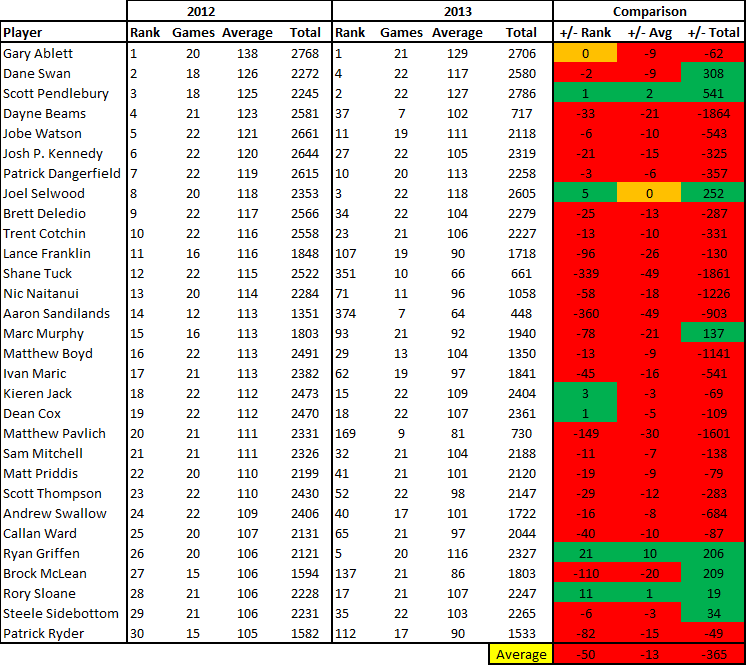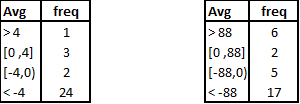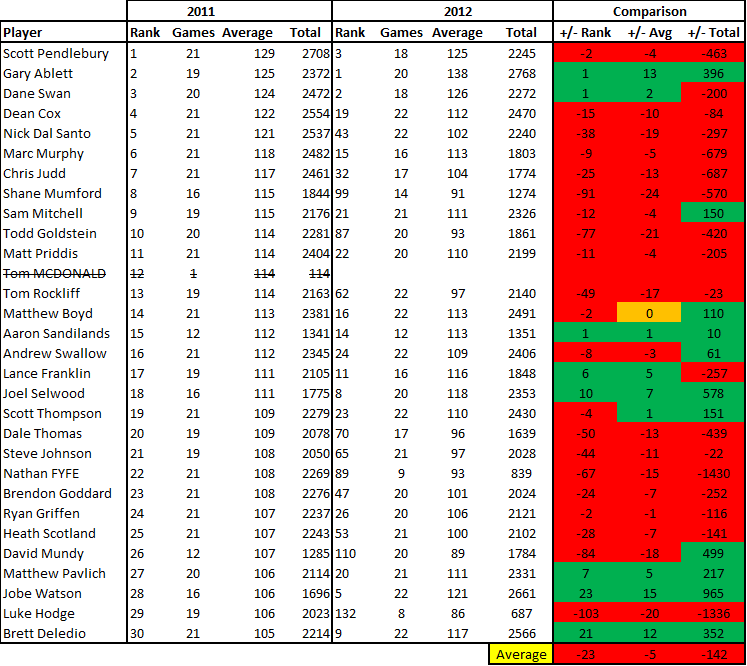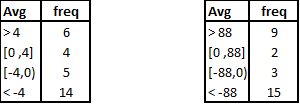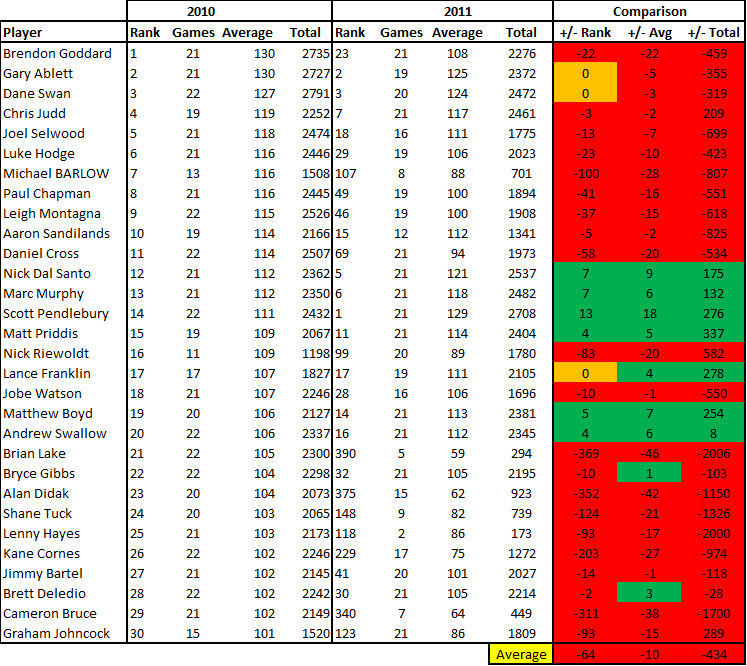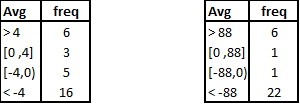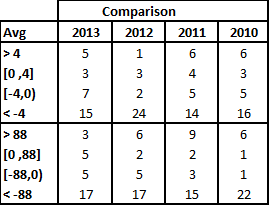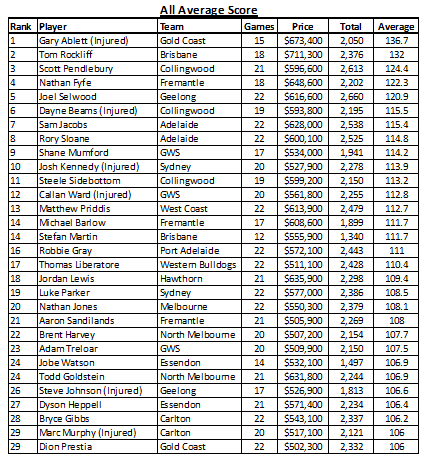Tip a Top 30: Using last year’s points to predict the future
Good on ya Mum. Tip Top’s the one. Good on ya Mum! as the ad goes for the daily loaf of bread. In Supercoachland this could easily be sung as Hey Mate. Tip, a Top 30’s the one. Good on ya Mate!

It is often stated in threads that a player is a premium. That he is locked in your side for the year, or an upgrade target to finish the side, as he’ll be a top 10 in that position at the end of the season. Often we look at the players past year and predict this to be his new norm or he’ll improve upon his previous season. He’ll regularly be from last years’ top 30. But how often is this truly the case?
Following on from Rowsus’ Chasing Last Year’s Points series and The year after being in the Top 50 averages, taking a look from a different angle, let’s look at top 30 players from 2013 and see how they fared in 2014.
Class of 2013
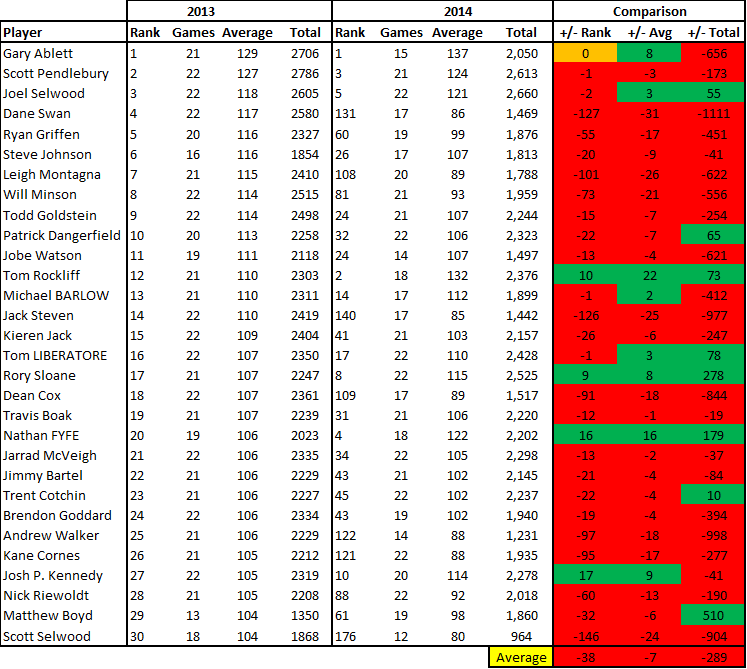
As you can see of the top 30 2013 players only 8 actually increased their average in 2014. Of which only 2 were from the top 10, one of whom was named Gary Ablett Jr. 5 of these players, Ablett, Rockliff, Sloane, Fyfe and JPK, increased their average by more than 4pts and were predicted to do so by most, and 3 Jelwood, Liberatore and Barlow, by 3pts or less. Delving further it can be seen that only 5 players with an average increase actually lead to increased points for the season. Jelwood with 55, Rockliff (73) despite 3 less games, Liberatore (78), Sloane (278) and Fyfe (179) despite 1 less game. Gary Ablett on the other hand lost 656pts against the previous season due to injury.
7 players had what you may call an acceptable decrease of 4pts or less Pendlebury, Watson, Boak, McVeigh, Bartel, Cotchin and Goddard, though Supercoachers would have been hoping for better for most. Cotchin (10) actually had an increase his total points for the season by virtue of an extra game played, with all the others losing between 37 and 621pts.
This leaves us with half the top 30 who had what would be classified as unacceptable decrease of 6pts or more, 10 of whom a 13pt or more drop off. Despite having an unacceptable decrease both Dangerfield (65) and Boyd (510) increased their seasons points total virtue of extra games played, whilst all others lost points of between 41 and 1111 (Swan).
3 of the top 10 remained so the following season, and 5, yes 5, didn’t remain within the top 30.
18 out of the 30 failed to make the top 30 the following season.
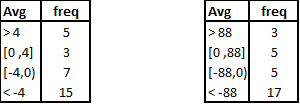
#Data used in this article was obtained from tooserious.net and footywire.com
Good on ya Mum. Tip Top’s the one. Good on ya Mum! as the ad goes for the daily loaf of bread. In Supercoachland this could easily be sung as Hey Mate. Tip, a Top 30’s the one. Good on ya Mate!

It is often stated in threads that a player is a premium. That he is locked in your side for the year, or an upgrade target to finish the side, as he’ll be a top 10 in that position at the end of the season. Often we look at the players past year and predict this to be his new norm or he’ll improve upon his previous season. He’ll regularly be from last years’ top 30. But how often is this truly the case?
Following on from Rowsus’ Chasing Last Year’s Points series and The year after being in the Top 50 averages, taking a look from a different angle, let’s look at top 30 players from 2013 and see how they fared in 2014.
Class of 2013

As you can see of the top 30 2013 players only 8 actually increased their average in 2014. Of which only 2 were from the top 10, one of whom was named Gary Ablett Jr. 5 of these players, Ablett, Rockliff, Sloane, Fyfe and JPK, increased their average by more than 4pts and were predicted to do so by most, and 3 Jelwood, Liberatore and Barlow, by 3pts or less. Delving further it can be seen that only 5 players with an average increase actually lead to increased points for the season. Jelwood with 55, Rockliff (73) despite 3 less games, Liberatore (78), Sloane (278) and Fyfe (179) despite 1 less game. Gary Ablett on the other hand lost 656pts against the previous season due to injury.
7 players had what you may call an acceptable decrease of 4pts or less Pendlebury, Watson, Boak, McVeigh, Bartel, Cotchin and Goddard, though Supercoachers would have been hoping for better for most. Cotchin (10) actually had an increase his total points for the season by virtue of an extra game played, with all the others losing between 37 and 621pts.
This leaves us with half the top 30 who had what would be classified as unacceptable decrease of 6pts or more, 10 of whom a 13pt or more drop off. Despite having an unacceptable decrease both Dangerfield (65) and Boyd (510) increased their seasons points total virtue of extra games played, whilst all others lost points of between 41 and 1111 (Swan).
3 of the top 10 remained so the following season, and 5, yes 5, didn’t remain within the top 30.
18 out of the 30 failed to make the top 30 the following season.

#Data used in this article was obtained from tooserious.net and footywire.com
Last edited:

